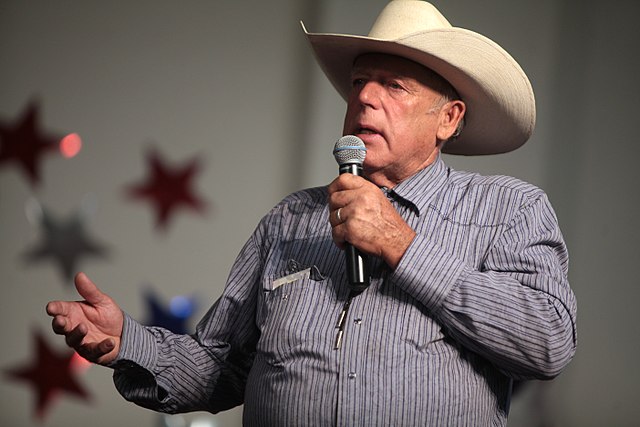American News
Bundy insists US can’t own land, no matter who’s president

Some watching Cliven Bundy’s case think his message will find more traction under President Donald Trump, who has moved to open public lands to industry, than it did under former President Barack Obama. (Photo By Gage Skidmore from Peoria, AZ, United States of America – Cliven Bundy, CC BY-SA 2.0)
LAS VEGAS — The Nevada rancher who had his charges dismissed in a 2014 armed standoff with government agents insisted Tuesday that it’s up to the states, not the federal officials, how to manage vast expanses of rangeland in the U.S. West.
Some watching Cliven Bundy’s case think his message will find more traction under President Donald Trump, who has moved to open public lands to industry, than it did under former President Barack Obama.
But the states’ rights figure who has become an icon in conservative and anti-government circles said public land belongs to states, no matter who is in the White House.
“I don’t recognize the federal government to have authority, jurisdiction, no matter who the president is,” he said.
Ian Bartrum, a University of Nevada, Las Vegas, law professor who has been writing about the Bundy case and federal land policy, said he sees a blend of beliefs between Trump supporters and Bundy backers.
“It certainly seems like this is a good moment for the Bundys to find a receptive ear in the White House, federal agencies and, perhaps, Congress,” Bartrum said.
Bartrum noted that Trump dramatically reduced Bears Ears and Grand Staircase-Escalante national monuments in Utah and that Interior Secretary Ryan Zinke is recommending downsizing Nevada’s Gold Butte and Oregon’s Cascade Siskiyou monuments.
Bundy cattle are grazing in Gold Butte, a rugged area 90 miles (145 kilometres) northeast of Las Vegas that Obama declared a national monument in December 2016 after years of calls to protect habitat for endangered desert tortoises. The standoff began over U.S. agents rounding up his cows some 20 years after he quit paying grazing fees to the federal government.
The 71-year-old Bundy appears to relish the return to the public eye after being set free from federal custody Monday for the first time since early 2016.
“Nevada, the Western U.S. and all of America, I think we do need changes. The federal government, BLM, is through suing Western ranchers,” he declared, referring to the U.S. Bureau of Land Management. “This is the last fire they’re going to set.”
Bartrum dismissed Bundy’s contention that the federal government has no authority over vast public land in the West, saying in a draft law review article that “constitutional doctrine, well-settled in the Supreme Court, expressly recognizes the federal government’s power to acquire, retain and regulate” property within a state.
John Lamb, a farmer turned blogger from Bozeman, Montana, who attended trials for those charged in the standoff case, said he believes states’ rights are prevailing.
“The government has been heavy-handed taking away our rights,” Lamb said. “It isn’t just about grazing or farming. It’s about government overreach and people being locked up on federal charges. I think Trump sees that.”
Chief U.S. District Judge Gloria Navarro in Las Vegas dismissed all federal charges this week against Bundy, his sons Ryan and Ammon Bundy, and Montana militia leader Ryan Payne, citing federal prosecutors’ misconduct with evidence.
The case drew the attention of U.S. Attorney General Jeff Sessions, who launched an investigation last month after Navarro declared a mistrial. Sessions also announced this week the appointment of a Texas federal prosecutor, Dayle Elieson, as interim U.S. attorney in Nevada.
Elieson, who replaces the Bundy prosecutor, Steven Myhre, as head of the Las Vegas office, has not said whether she will appeal the case to the 9th Circuit Court of Appeals.
A spokeswoman for the federal prosecutor’s office in Las Vegas declined to comment Tuesday.
Gregg Cawley, a University of Wyoming professor who is following the case, said he doubted the Justice Department will appeal the dismissal so prosecutors can retry Bundy.
“I don’t think the Trump administration directly explains this,” Cawley said. “But it might reflect the general mood.”
The end of the case alarmed the Anti-Defamation League in New York.
“This result can only embolden anti-government extremists,” especially in Western states, organization chief executive Jonathan Greenblatt said in a statement, “and make future confrontations and standoffs with the government more likely.”





















